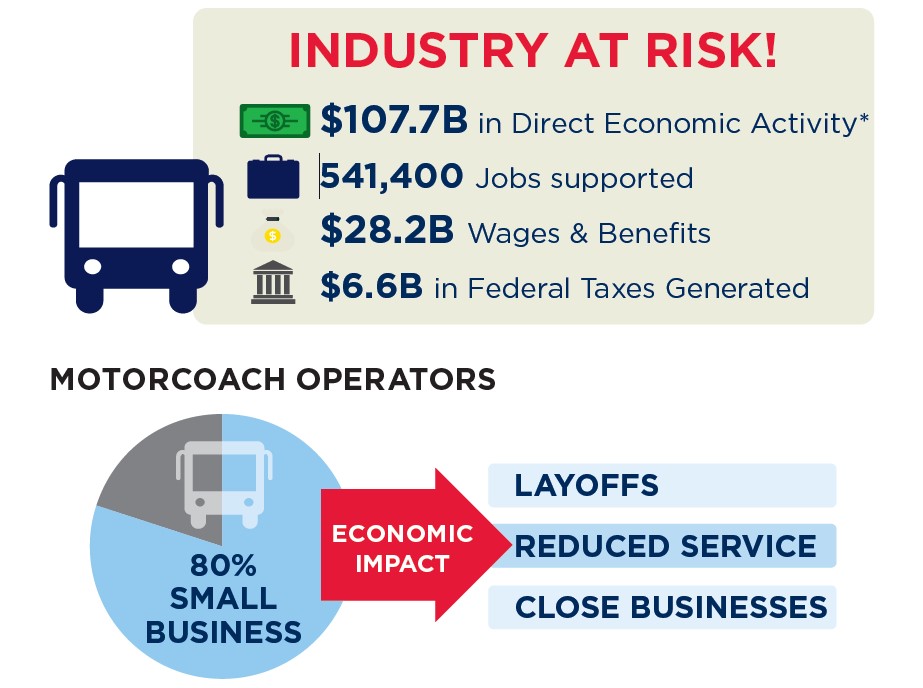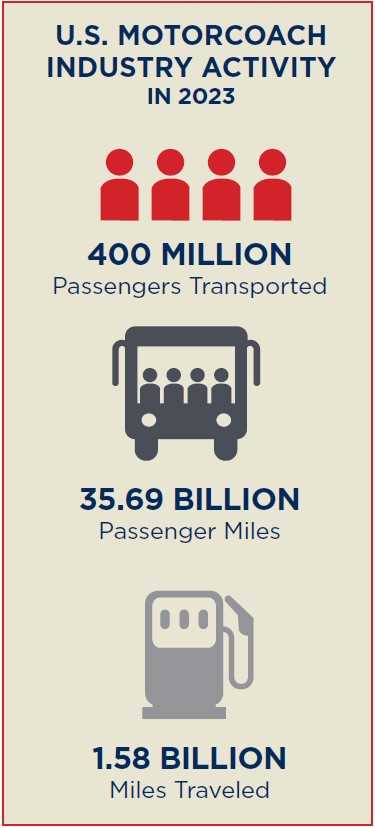Tariffs Resource Hub
The American Bus Association is closely monitoring recent tariff developments that could impact the motorcoach industry. While motorcoach imports from Canada and Mexico remain unaffected under the United States-Mexico-Canada Agreement (USMCA), new reciprocal tariffs have been imposed on motorcoaches from other key manufacturing countries, including North Macedonia, Turkey, and Germany. Additionally, existing tariffs on steel and aluminum remain in place, and broader tariff actions—particularly against China—continue to evolve. Given the fluid nature of these policies, ABA is committed to keeping members informed of any changes that may affect their operations and procurement decisions.
Get Informed
- Read the President’s Executive Order on so-called reciprocal tariffs.
- Review the country-by-country reciprocal tariff rate.
- Why are Canada and Mexico not showing up on the reciprocal tariff list? Read the ABA SVP of Public Affairs and Government Relations Policy Brief explaining how ABA’s action led the way in supporting motorcoach trade across our borders.
Get Involved
To send a letter directly to your elected officials supporting tariff relief for motorcoaches, visit the ABA Member Activation Hub.
Impact of Tariffs on the U.S. Economy and Motorcoach Industry

Manufacturing Supply Chain
Motorcoach original equipment manufacturers (OEMs) are primarily based in Canada and Europe, with no producers in the United States since the 1980s. While many motorcoaches are imported, critical components such as engines, transmissions, and electrical systems are produced in the U.S. Imposing tariffs on imported vehicles would disrupt the supply chain, increasing costs and negatively impacting domestic manufacturers and consumers alike.
Higher Costs for Operators and Consumers
Increased Operating Costs: Tariffs would raise the cost of new vehicles and components, making it more expensive for operators to maintain or grow their fleets.
Price Hikes for Consumers: Higher operating costs would be passed on to consumers, making motorcoach travel less affordable for families, tourists, and commuters. This would particularly impact rural and underserved communities relying on affordable transportation options.
Innovation and Sustainability Stalled
Hindrance to Fleet Modernization: Tariffs would discourage operators from investing in newer, safer, and more efficient vehicles, delaying advancements in safety, fuel efficiency, and emissions reduction.
Environmental Backslide: Motorcoaches are the most efficient form of mass transportation, removing up to 30 cars from the road per trip. Increased costs could reduce ridership, resulting in higher emissions and more congestion.
Threat to Essential Services
Disrupted Connectivity: Motorcoaches provide nearly 400 million passenger trips annually, connecting urban and rural areas, including communities without access to airports or rail lines. Tariffs could jeopardize these critical services.
Emergency Preparedness Undermined: Motorcoaches play a vital role in military transportation and emergency evacuations during natural disasters. Reduced fleet availability could hinder these essential operations.
Imposing tariffs on motorcoaches and components would have a ripple effect, harming the economy, the motorcoach industry, and millions of consumers.
What You Can Do
The American Bus Association urges members, consumers, and group travel professionals to ask Congress for an exclusion process for motorcoach companies impacted by the ongoing tariff increases.
Submit your details below to identify your local Member of Congress and generate your unique Group Travel letter. Review the letter, customize it if needed, and push send to make your voice heard.
In the window below, enter your name and mailing information. This will bring up a draft of a pre-written letter. (You may edit the letter if you choose.) Once you’re ready, click “Submit,,” and a copy will be sent to the listed representatives.
Key Resources
Stay informed about the latest tariff developments impacting the motorcoach and travel industries. Below are key resources, press mentions, and research articles providing insights into the economic effects, industry responses, and the importance of cross-border travel.

🔹 Article: “What Trump’s Tariff Chaos Could Mean For Transportation” (Column from Streetsblog USA) – ABAF’s recent impact study is cited in a comprehensive look at how tariffs will impact alternative transportation methods.
🔗 Read more
🔹 Article: “C&J Bus hit hard by tariffs on Canada: ‘We don’t know what the future holds'” (News story in Foster’s Daily Democrat) – C&J Bus Lines’ Jim Jalbert has an extensive interview in this article, providing a perfect case study on the actual effects of tariffs on a bus operator’s bottom line.
🔗 Read more
🔹 OMCA/MCC’s Call to Action: Canada/U.S. Tariffs Resource Page (For Canadian members) – Outlines actions for OMCA/MCC members to help pressure the Canadian government to remove buses and parts from Canada’s retaliatory tariff list.
🔗 Read more
🔹 Opinion: Don’t Forget Tourism in Trade War Debate (Opinion article in Crain’s Detroit Business) – ABA’s Fred Ferguson highlights the importance of travel and tourism between Canada and the U.S., especially between border cities.
🔗 Read more (currently free to read)
🔹 Press Release: ABA and UMA Advocate for Tariff Relief on Motorcoach Imports (ABA/UMA joint letter) – ABA’s Fred Ferguson and UMA’s Scott Michael sent a joint letter urging the administration to consider including motorcoaches in the one-month tariff delay recently given to the automotive industry.
🔗 Read more
🔹 Article: “As Canadians cancel trips due to Trump, the U.S. tourism industry could lose billions” (NPR story on tariffs affecting tourism) – ABA’s Fred Ferguson was interviewed about the impact on motorcoach production and effects on cross-border tourism.
🔗 Read more
🔹 ABA Tariff Policy Brief (ABA’s tariff talking points) – A policy insert outlining the American Bus Association’s stance on proposed tariffs and their impact on the industry.
🔗 Read more
🔹 Article: Strengthening U.S.-Canada Tourism (Op-Ed in the Niagara Gazette) – A look at the critical economic ties between the U.S. and Canada through travel and tourism.
🔗 Read more
🔹 Research: Economic Risks of Proposed Tariffs (2025 report from ABA Foundation and Tourism Economics) – A new study analyzing the potential consequences of motorcoach tariffs and the industry’s essential role in the economy.
🔗 Read more
🔹 Research: Trade War and U.S. Travel Sector (Latest research from Tourism Economics) – How escalating trade tensions could disrupt travel and tourism across borders.
🔗 Read more
🔹 Research: Motorcoach Industry Research (2024 Motorcoach Census from the ABA Foundation) – An in-depth study on the size and scope of the motorcoach industry, highlighting its economic contributions.
🔗 Read more
